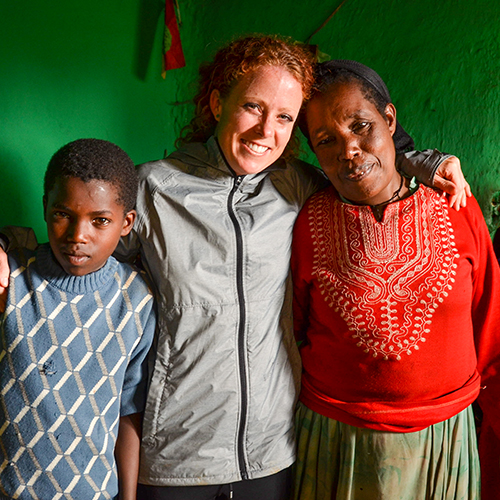I was nervous about so many things, especially the home visits. This was my first trip with Children’s HopeChest to Ethiopia, and I didn’t know what to expect when I stepped across the threshold of someone’s home half a world away from what was familiar to me. Our leaders, Whitney & Kurt, taught us about the Ethiopian culture of hospitality and how we should prepare to accept whatever they offer us. Yep. Got it. Not a problem!
We landed in Addis Ababa, and right from the airport we went to a home visit to see the life-changing home renovations as part of the community transformation at Aware CarePoint. I felt so many emotions, having only been in the country for a couple of hours. We gathered around in the tiny room as our hostess prepared a coffee ceremony. As if I wasn’t nervous enough, my heart started beating faster. Coffee. Wait, no one said that was what they were going to serve us?! I don’t drink coffee! Yikes. Horrified, I did not want to offend these beautiful people so I tried really hard to suck down the tiny cup. I couldn’t finish it and felt terrible. Whitney helped ease my anxiety, but that night, I still laid awake feeling bad. On the next home visit I vowed to finish my coffee.

What’s the big deal about coffee? Coffee is a huge part of Ethiopian culture and being invited to a coffee ceremony is a sign of friendship, respect, and hospitality. Traditionally the beans are roasted in a pan over a tiny charcoal stove. When the beans are black and shiny they are ground by a pestle and mortar. Next the grounds are stirred into a clay coffee pot known as a ‘jebena’. The coffee is then strained and poured into small cups and served with sugar. Often the coffee is paired with a snack such as popcorn, peanuts, or cooked barley.
Many people believe that Ethiopia is the birthplace of coffee. Today coffee generates over two-thirds of the country’s earnings and is considered some of the finest in the world. The traditional Ethiopian coffee ceremony is a beautiful example of conversations and relationships and a large part of their culture.
By the end of the trip I enjoyed the coffee, finished every cup, and even left Ethiopia as a coffee drinker! Although, as much as I like coffee now, I love the relationships that introduced me to it the most, and now my heart longs to sit in a tiny one room home, smelling the rich smoky smell of the roasted beans, eating popcorn, hearing stories of God’s love and perseverance, and drinking fresh coffee with my new Ethiopian friends.
Originally published at http://burayu.hopechest.org/ethiopian-cultural-corner-coffee/
If you are interested in learning what it would look like to get your church or community involved in a transformative partnership with HopeChest, send us a note!





